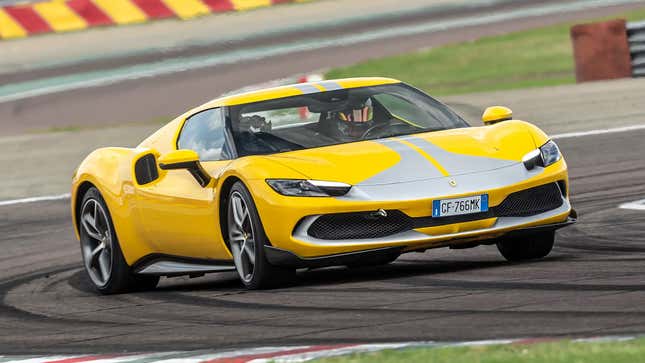
Somehow Ferrari has done it. The Italian Stallion brand has cracked the RWD acceleration code, beating out the McLaren Artura and Lamborghini Huracan STO in Car And Driver’s recent acceleration test of the mid-engine hybrid V6 monster known as the 269 GTB.
Where the Macca and Lambo have turned in 2.6-second 0-60 times, the Fezza jumped off the line in a staggering 2.4 seconds. Any car that accelerates quicker than this is either equipped with four driven wheels, drag slicks, or a jet engine. A couple of cars claim quicker 0-60 times, including the McMurtry Spierling and Dodge SRT Demon 170, though it’s a stretch to label them as production.
Even better, the Ferrari manages to extend its lead on the competition by the time it hits 100 miles per hour, getting there in just 4.7 seconds. That’s the kind of blistering speed that 819 horsepower will get you. Of course the ultra sticky Michelin Pilot Sport Cup 2R tires are doing everything they can to put that power to the pavement, and the Ferrari likely owes as much of its speedy sprint to the tire development team as it does the powertrain and traction control engineers.
Perhaps more interesting than how fast it goes, the Ferrari (quite hefty at 3532 pounds) manages to stop even quicker. Only one car has ever stopped from C/D’s 70 miles per hour in less distance than the Ferrari, the C7 Corvette ZR1. 130 feet is all it takes to go from highway speed to completely dead stopped. If you do that with a tractor trailer behind you, you’ll end up smooshed, so don’t panic stop unless you have the space to do it. Again the tires are doing the lion’s share of the work here, but the 15.7-inch carbon ceramic rotors on the front axle aren’t exactly ballast.
With that kind of acceleration and braking, the Ferrari could probably run from zero to sixty back to zero and back to sixty again before my 1976 Porsche 912E got to sixty the first time, let alone stopped! It’s pretty amazing how far technology has come that rear-drive sports cars are hitting sub-three-second 60 sprints. Then again, it does start at $343,000, so you get what you pay for.

